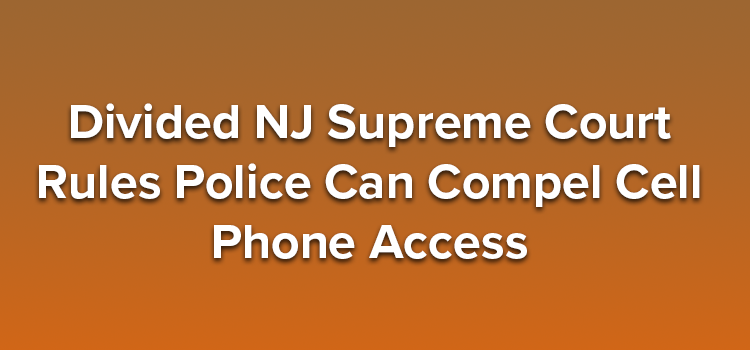In State v. Robert Andrews, (A-72-18/082209) (Decided August 10, 2020), the New Jersey Supreme Court held that a defendant can be compelled to disclose a cellphone password. According to the four-member majority, requiring defendants to unlock their phones does not violate the Self- Incrimination Clause of the Fifth Amendment to the United States Constitution or New Jersey’s common law or statutory protections against self-incrimination.

Facts of State v. Andrews
Defendant Robert Andrews, who worked as an Essex County sheriff’s officer, was identified by a suspected drug trafficker as having helped him conceal his drug-trafficking activities. A trial court judge ordered Andrews to provide the PIN and passwords for his lawfully seized iPhones that he allegedly used to aid the drug-trafficker.
Andrews argued that the compelled disclosure of this information violates his right against self-incrimination under the Fifth Amendment to the U.S. Constitution, and the protections against self-incrimination afforded under New Jersey law. However, the Appellate Division sided with the government. It held that the trial court correctly found that compelled disclosure of the defendant’s passcodes does not violate the defendant’s Fifth Amendment privilege against self-incrimination. “Applying the privilege against self-incrimination to cell phone passcodes would essentially preclude the State from obtaining the contents of any passcode-restricted device as part of a criminal investigation,” Judge Joseph L. Yannotti wrote.
NJ Supreme Court’s Decision in State v. Andrews
By a vote of 4-3, the Supreme Court of New Jersey held that a court order requiring a criminal defendant to disclose the passcodes to his passcode-protected cellphones does not violate the Fifth Amendment’s Self-Incrimination Clause or New Jersey’s common law or statutory protections against self-incrimination.
The court first addressed the Fourth Amendment, noting that Andrews didn’t challenge the search warrants issued for his cellphones. “Thus, the State is permitted to access the phones’ contents, as limited by the trial court’s order, in the same way that the State may survey a home, vehicle, or other place that is the subject of a search warrant,” Justice Solomon said.
The New Jersey Supreme Court next turned to the Fifth Amendment right against self-incrimination, emphasizing that it applies only when the accused is compelled to make a testimonial communication that is incriminating. “The Fifth Amendment right against self-incrimination applies only when the accused is compelled to make a testimonial communication that is incriminating,” Justice Solomon wrote. “Actions that do not require an individual to disclose any knowledge he might have or to speak his guilt are nontestimonial and therefore not protected.” Solomon added that in contrast to physical communications, if an individual is compelled “to disclose the contents of his own mind,” such disclosure implicates the Fifth Amendment privilege against self-incrimination.”
Applying these principles, the court concluded that communicating or entering a passcode requires facts contained within the holder’s mind and, thus, is a testimonial act of production. However, the inquiry did not end there. The court further held that compelled production of the passcodes falls within the foregone conclusion exception. Under the Fifth Amendment exception, production that is of a testimonial nature can be compelled if the Government can demonstrate it already knows the information that act will reveal — if, in other words, the existence of the requested documents, their authenticity, and the defendant’s possession of and control over them — are a foregone conclusion.
“Based on the record before us, we have little difficulty concluding that compelled production of the passcodes falls within the foregone conclusion exception,” Justice Solomon wrote. “The State’s demonstration of the passcodes’ existence, Andrews’s previous possession and operation of the cellphones, and the passcodes’ self- authenticating nature render the issue here one of surrender, not testimony, and the foregone conclusion exception to the Fifth Amendment privilege against self-incrimination thus applies.”
Dissent in State v. Andrews Justice Jaynee LaVecchia authored a dissent, in which Justices Barry Albin and Walter Timpone joined. “In my view, … the Court’s outcome deviates from steadfast past principles protective of a defendant’s personal autonomy in the face of governmental compulsion in a criminal matter,” LaVecchia argued.
